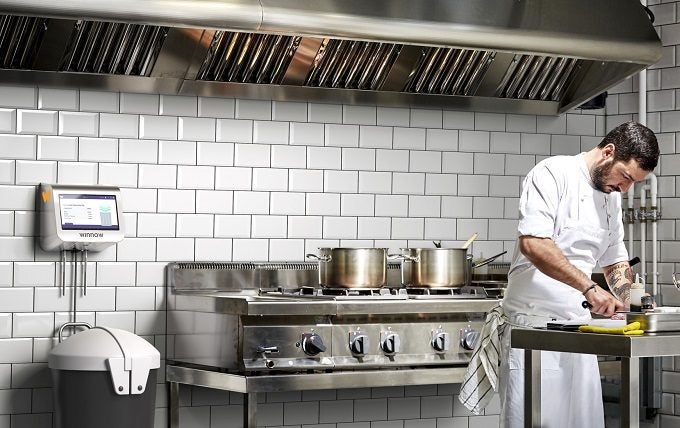
Food waste is still a major issue for foodservice operators – but what if an artificial intelligence (AI) system could help restaurants keep track of the food they discard?
Over the last two years, London-headquartered tech specialist Winnow has been trialling one such solution. Winnow Vision is AI-enabled ‘smart bin’ technology that the company hopes will revolutionise food management for the hospitality industry.
The product launched today after a testing phase, which began in 2018, with early adopters IKEA and the Emaar Hospitality Group.
Using AI to analyse food waste
Winnow Vision consists of a camera, a set of ‘smart scales’ and machine learning technology. Using AI, the system photographs different foodstuffs being thrown into a food waste receptacle, passes the data through an algorithm, and automatically calculates the financial and environmental cost of discarded food.
Vision is an update to Winnow’s previous system, which consisted of the same smart scale technology but required food to be identified manually via a touchscreen. The company says the previous system helped commercial kitchens save over £30m in food costs a year – the equivalent of 23 million meals being thrown in the bin. However, staff training and human error meant that waste was not always being tracked correctly.
The new AI-bolstered Vision can already recognise most food items when installed, with staff only required to input kitchen-specific menu items during a ‘training and automation’ process. As time goes on, the system ‘learns’ to recognise what’s being thrown in the bin with more accuracy than the human eye; at IKEA, for example, the system is even able to distinguish between vegetarian balls and the company’s iconic Swedish meatballs.

US Tariffs are shifting - will you react or anticipate?
Don’t let policy changes catch you off guard. Stay proactive with real-time data and expert analysis.
By GlobalData“Winnow Vision is the realisation of how we wanted to build this technology in the first place, which is to use AI to automate that process, making sure that our data is more accurate, ensuring that it saves time, and making it easily scalable across a large number of operations,” says Winnow CEO and founder Marc Zornes.
The new Winnow Vision has already been installed in more than 75 kitchens, with the expectation that it could be rolled out across hundreds more this year. According to Zornes, Winnow aims to help the hospitality industry save £1bn per annum by 2025, and is targeting clients across the contract catering, quick-service, hotel and casino, cruise line and supermarket sectors.
Tackling food waste through smart technologies

Food waste is still a major issue, costing the hospitality industry around $100bn a year. According to Winnow, commercial kitchens waste between 5% and 15% of total spend across their food purchases, with some kitchens wasting up to 20% of all the food they buy.
Zornes says that, surprisingly, many restaurants still aren’t tracking food waste and ones that do have staff write food wastage figures on a clipboard or weigh buckets of food waste. These methods are labour-intensive, inaccurate and fail to provide insight into the food being thrown away in terms of whether high or low-value foods are being binned.
“We want to be able to get insight on what’s being wasted that’s really costing the business money and then focusing on that to prevent it,” says Zornes.
Adoption of the smart technology, he adds, is spurring companies to set new food waste reduction targets across their businesses. IKEA, which has installed Winnow Vision across 23 stores in the UK and Ireland, has set an objective of cutting food waste across its operations before the end of August 2020.
“Our partnership with Winnow is critical to realising that goal,” says IKEA UK and Ireland country sustainability manager Hege Sæbjørnsen. “We know that food waste is a complex issue, but Winnow Vision demonstrates that solutions to help tackle this don’t have to be.”
The future of smart tech in commercial kitchens

Digitalisation is steadily creeping into more aspects of foodservice and hospitality as customers demand increased convenience and new experiences. However, Winnow Vision begs the question of whether AI can help boost operations and reduce commercial kitchen costs in other ways.
Zornes says that chefs he has spoken with spend less than 25% of their work day in a kitchen because they are too busy dealing with paperwork and tracking inventory. He predicts that AI could help optimise these procedures in the future, but he doesn’t think we’ll see robots taking over the cooking any time soon.
“I think that there’s a lot of opportunity for big data, AI and connected devices to automate that process and help chefs make better culinary decisions, ultimately helping them run a more efficient operation that provides a better service to the end customer,” Zornes concludes.







